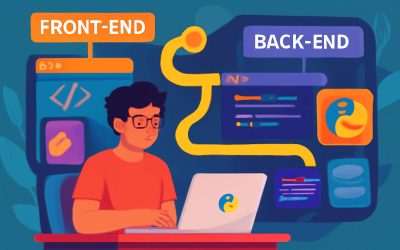Understanding the Full Stack Developer Role
Definition and Scope of a Full Stack Developer
In a digital landscape where versatility is king, the full stack developer role stands out as a beacon of adaptability and expertise. These professionals are the architects behind seamless web applications, wielding a mastery over both front-end aesthetics and back-end architecture. Their scope isn’t confined to just coding; it extends to understanding user experience, database management, and server configuration, making them true full-spectrum creators.
Imagine a developer who can craft an engaging interface while simultaneously orchestrating the intricate logic running behind the scenes. This multi-skilled approach often means wearing multiple hats—designing intuitive layouts, ensuring robust security, and maintaining high-performance servers. The full stack developer role encompasses these responsibilities and more, reflecting a rare blend of creativity and technical prowess.
To truly grasp the scope of a full stack developer, consider the diverse skills involved:
- Designing captivating user interfaces with HTML, CSS, and JavaScript
- Building scalable server-side applications using frameworks like Node.js or Django
- Managing databases such as MySQL or MongoDB
- Optimising website performance and ensuring security measures are in place
Key Responsibilities and Tasks
Understanding the full stack developer role means appreciating a tapestry of responsibilities woven with technical finesse and creative flair. These professionals are the unsung heroes who juggle multiple tasks, seamlessly shifting from designing compelling user interfaces to managing complex server-side logic. Their day-to-day tasks often include developing front-end components with HTML, CSS, and JavaScript, while also orchestrating backend processes using frameworks like Node.js or Django.
A full stack developer’s scope extends beyond mere coding; it demands a keen eye for performance optimisation and a vigilant stance on security. They often handle database management with tools like MySQL or MongoDB, ensuring data flows smoothly and securely. The versatility of the full stack developer role truly shines when they troubleshoot issues across different layers, ensuring a harmonious user experience.
- Designing intuitive UI/UX
- Building scalable backend applications
- Managing databases efficiently
These responsibilities highlight the depth and breadth of what a full stack developer role entails in today’s digital ecosystem.
Differences Between Front-End, Back-End, and Full Stack Developers
Understanding the full stack developer role requires recognising the distinct skills and responsibilities that set them apart from specialised developers. While front-end developers focus on crafting engaging user interfaces using HTML, CSS, and JavaScript, back-end developers handle server-side logic, databases, and application architecture. The full stack developer role bridges these worlds, combining both skill sets seamlessly.
This versatility allows full stack developers to troubleshoot issues across different layers of an application, ensuring smooth performance and security. Unlike their front-end or back-end counterparts, they possess the ability to adapt quickly and contribute to every stage of development.
In essence, the full stack developer role is characterised by a broad scope and deep technical knowledge. It involves understanding the interplay between user experience and robust backend systems, which makes them invaluable in modern digital projects. For those exploring careers in software development, grasping these differences is crucial!
Skills and Technologies Required for a Full Stack Developer
Frontend Technologies – Array
In the intricate dance of modern software creation, a full stack developer role demands a mastery that spans beyond superficial understanding. The front-end technologies form the visual gateway to user engagement, but beneath that surface lies a complex web of skills that require both finesse and depth. Mastery of HTML, CSS, and JavaScript is essential, yet true full stack developers delve into frameworks like React or Angular, transforming static pages into dynamic experiences.
Their arsenal often includes a keen understanding of version control systems such as Git, enabling seamless collaboration and continuous integration. This role isn’t confined to just mastering tools but also involves an innate capacity to adapt to rapidly evolving technologies. The full stack developer role is as much about problem-solving as it is about crafting elegant, efficient code that withstands the test of time. Only in embracing this multifaceted expertise can one truly navigate the labyrinth of modern web development.
Backend Technologies – Array
While front-end finesse often steals the spotlight, the backbone of a successful full stack developer role lies in mastery of backend technologies that keep the digital engine humming smoothly. It’s here that languages like Python, Ruby, Java, and PHP become the unsung heroes, orchestrating data flow and server logic with quiet efficiency. A deep understanding of databases—be it SQL or NoSQL—enables the full stack developer to craft scalable, robust applications that perform under pressure.
Equipped with skills in server management and API development, a full stack developer must navigate the intricate world of backend frameworks such as Node.js, Django, or Spring Boot. These tools transform complex business logic into streamlined processes, ensuring that the entire system remains resilient and adaptable. Often, their toolkit includes:
- Database architecture design
- API development and integration
- Server-side scripting
- Security protocols and authentication mechanisms
In essence, the full stack developer role demands a seamless blend of technical prowess and problem-solving finesse—turning abstract concepts into tangible digital solutions that stand the test of time and user expectation. It’s a role that challenges even the most seasoned developers to stay perpetually curious and adaptable in a landscape that evolves faster than most can keep up with.
Databases – Array
Mastering databases is a cornerstone of the full stack developer role, yet it often remains behind the scenes—like the secret sauce in grandma’s stew. Whether it’s SQL for structured data or NoSQL for more flexible storage, understanding how to design and query these databases is essential. A full stack developer must be adept at crafting data schemas, creating efficient queries, and ensuring data integrity, all while juggling the demands of scalable, high-performance applications.
In addition, familiarity with database management tools and concepts like indexing, replication, and sharding can set a developer apart. These skills enable the creation of resilient systems that can handle a barrage of simultaneous users without breaking a sweat. This is where the full stack developer role truly shines, blending technical finesse with practicality to turn complex data needs into elegant solutions.
Some of the key skills required include:
- Designing relational and non-relational database architectures
- Writing complex queries and optimisation techniques
- Managing database security and user authentication
- Implementing data caching strategies to boost speed
In the end, databases are the unsung heroes of a full stack developer’s toolkit—quietly powering the seamless digital experiences users have come to expect. Without a solid grasp of these technologies, even the most talented developer risks building castles in the sand.
Version Control and DevOps Tools – Array
In the intricate tapestry of the full stack developer role, mastering version control and DevOps tools is like possessing a secret code that unlocks seamless collaboration and rapid deployment. These technologies are the backbone of modern software development, enabling teams to track changes effortlessly and roll back updates with precision. Without them, managing complex projects becomes akin to navigating a labyrinth blindfolded.
Version control systems such as Git empower developers to maintain a comprehensive history of code changes, fostering transparency and collaboration. Meanwhile, DevOps tools like Jenkins, Docker, and Kubernetes streamline continuous integration and continuous delivery (CI/CD), turning what was once a painstaking process into an automated dance of efficiency.
- Implementing CI/CD pipelines to accelerate feature releases
- Managing containerised environments for scalable deployment
- Monitoring system health and automating recovery processes
For the full stack developer role, honing skills in these areas is not optional but essential. These tools serve as the unseen forces that keep applications resilient, adaptable, and ready for the demands of today’s digital landscape. Mastery here transforms a good developer into an indispensable asset, capable of orchestrating complex operations with finesse and precision.
Additional Skills – Array
Within the grand symphony of the full stack developer role, a mastery of diverse skills and cutting-edge technologies elevates a developer from competent to extraordinary. It’s not merely about knowing how to code; it’s about orchestrating a seamless harmony between frontend finesse and backend robustness. This role demands a keen eye for detail, an inventive spirit, and an unwavering commitment to innovation.
To truly excel, a full stack developer must embrace a versatile toolkit — from modern frameworks to scalable cloud services. Proficiency in JavaScript frameworks like React or Angular, combined with an understanding of server-side languages such as Node.js or Python, forms the core of their arsenal. Equally vital is familiarity with cloud platforms like AWS or Azure, which transform static applications into resilient, scalable marvels.
Additional skills often include expertise in API design, security protocols, and performance optimisation. An adept full stack developer also navigates the intricate maze of containerisation and orchestration tools like Docker and Kubernetes, ensuring applications are not only functional but flexible and future-proof. These elements forge a resilient digital architecture that adapts to the relentless pace of technological evolution.
- Deep understanding of user experience and interface design principles
- Proficiency in RESTful API development and integration
- Knowledge of serverless computing and microservices architecture
In essence, the full stack developer role is a tapestry woven with threads of innovation, adaptability, and technical prowess. The journey through these multifaceted skills transforms a developer from a mere coder into a visionary architect of digital landscapes — an indispensable force in today’s relentless pursuit of technological excellence.
The Importance of a Full Stack Developer in Modern Tech Teams
Advantages of Hiring Full Stack Developers – Array
In a world where tech teams are expected to wear multiple hats, the full stack developer role has become the Swiss Army knife of software development. These versatile professionals bridge the gap between front-end flair and back-end brilliance, making them indispensable assets in modern tech environments. Companies that harness the power of full stack developers often find themselves more agile, able to pivot swiftly when market demands shift like quicksand. Their ability to understand and work across the entire technology stack reduces bottlenecks and accelerates project timelines—imagine having a single person do the work of three specialists, but without the ego or the salary demands!
One of the key advantages of hiring full stack developers is their capacity to seamlessly integrate different parts of a project, ensuring consistency and cohesion. Their cross-disciplinary expertise means they can troubleshoot issues that span multiple layers of technology, providing a holistic approach to problem-solving. Additionally, this role fosters a collaborative environment where knowledge sharing is second nature, often leading to innovative solutions that might elude siloed teams. In essence, investing in a full stack developer role isn’t just about filling a position—it’s about empowering your team with a flexible, multi-talented powerhouse capable of tackling the most complex digital challenges with a grin.
Role in Agile and Start-up Environments
In the fast-paced world of modern technology, agility isn’t just an advantage—it’s a necessity. The full stack developer role has emerged as a pivotal force in shaping the success of startups and agile teams alike. These professionals bring a rare blend of skills that enable them to navigate seamlessly between front-end innovation and back-end robustness, often acting as the glue that holds complex projects together. Their ability to adapt rapidly and work across diverse technological layers makes them invaluable in environments where flexibility and speed are paramount.
Start-ups, in particular, thrive on multitasking mastery, often operating with lean teams that require members to wear multiple hats. The full stack developer role fits perfectly into this ecosystem, allowing for a streamlined development process without sacrificing quality. With their holistic understanding of the entire software stack, they can address emergent issues swiftly and prevent potential bottlenecks before they snowball. This capacity to oversee the entire development lifecycle ensures that start-up projects stay on track and adapt quickly to shifting market demands. Their presence is often the difference between a project floundering amidst chaos or soaring towards success.
Contributing to End-to-End Project Management
In today’s fast-moving tech landscape, the full stack developer role has become an indispensable part of modern teams. These professionals don’t just code; they orchestrate the entire development process, ensuring that front-end and back-end components work harmoniously. This holistic approach accelerates project timelines and fosters innovation by reducing handoff delays and miscommunication. In essence, a full stack developer acts as a bridge—connecting the user experience with the underlying infrastructure seamlessly.
What truly sets them apart is their ability to contribute to end-to-end project management. They oversee the full lifecycle, from initial design to deployment and maintenance. This comprehensive oversight means they can identify potential bottlenecks early and implement solutions that keep projects on course. For organisations aiming to stay agile and competitive, having a full stack developer role filled with versatile expertise can be the difference between stagnation and growth. Their capacity to adapt across layers of technology ensures that projects are not just completed but excel in delivering value at every stage.
Career Path and Growth Opportunities for Full Stack Developers
Entry-Level to Senior Roles
The journey of a full stack developer role is a compelling odyssey through the realms of innovation and mastery. As technology evolves at a breakneck pace, opportunities for growth within this multifaceted career path become not just attainable but inevitable. Entry-level positions often serve as the fertile ground where aspiring developers cultivate their foundational skills, embracing both front-end design and back-end logic. Over time, dedication and continuous learning open doors to more intricate responsibilities, leading towards senior roles that demand strategic thinking and leadership.
Progression in the full stack developer role can be mapped along a trajectory of increasing expertise. Many professionals transition from solo contributor to team lead, or even architect, shaping entire systems and guiding smaller teams. The versatility inherent in a full stack developer role ensures that growth isn’t confined to a single track but branches into specialised areas such as cloud architecture, DevOps, or product management. With each step upward, the potential for impact and innovation expands, making this career path as dynamic as the technologies it encompasses.
- Begin as an entry-level full stack developer, honing your skills across diverse technologies.
- Advance to mid-level roles, taking on more complex projects and collaborating across teams.
- Achieve senior positions, where strategic oversight and mentorship are key components of your responsibilities.
Ultimately, the full stack developer role offers a unique vantage point — a vantage point from which one can influence the entire software development lifecycle, from conception to deployment, and beyond. It is a role that promises not just a career, but a continuous journey of discovery and influence in the ever-expanding digital world.
Specialization and Niche Areas – Array
Embarking on a journey as a full stack developer unlocks a universe of career path and growth opportunities that shimmer with promise. As you traverse from novice to seasoned innovator, specialised niches beckon with their own unique allure. For example, many full stack developers find themselves drawn towards cloud architecture, where they harness the power of scalable infrastructure to transform ideas into reality. Others venture into DevOps, becoming maestros of continuous integration and deployment, orchestrating seamless symphonies of software delivery.
The versatility of the full stack developer role ensures that growth isn’t linear but rather a branching odyssey. Here are some pathways often pursued:
- Specialisation in front-end or back-end frameworks
- Transition into product management, steering projects from conception to realisation
- Exploration of niche areas such as cybersecurity or data science
Each step along this trajectory amplifies your impact, allowing you to shape entire digital ecosystems. The full stack developer role is not merely a position; it’s an evolving tapestry woven with innovation, mastery, and endless discovery.
Certifications and Continuous Learning – Array
Understanding the career path and growth opportunities for full stack developers reveals a landscape rich with potential and transformation. As technology evolves at breakneck speed, continuous learning and acquiring relevant certifications become vital for staying ahead. Many aspiring full stack developers find that specialised courses in cloud architecture, DevOps, or cybersecurity can significantly enhance their skill set and market value. These certifications serve as tangible proof of expertise, opening doors to higher-level roles and increased responsibilities.
Moreover, the journey of a full stack developer often involves exploring new domains that complement their core skills. For instance, gaining proficiency in project management or diving into niche areas like data science can diversify their capabilities and broaden their impact. The pursuit of knowledge isn’t just about personal growth; it’s about shaping a versatile, resilient career that adapts to the demands of the industry.
- Engage in specialised training programs tailored for full stack developers.
- Participate in online communities and hackathons to refine your skills and network.
- Seek mentorship and peer feedback to accelerate your professional development.
In essence, the full stack developer role is a dynamic tapestry woven with continuous learning, certification achievements, and an unyielding curiosity for innovation. Each step forward enhances your ability to influence entire digital ecosystems and elevates your career trajectory in the tech sphere.
Challenges Faced by Full Stack Developers
Managing Wide Skill Sets
Managing the expansive scope of the full stack developer role can often feel like navigating a labyrinth filled with ever-shifting corridors. The challenge lies in mastering an array of technologies, frameworks, and tools—each demanding precision and adaptability. This broad skill set, while a boon for versatility, presents a constant balancing act.
One of the most significant hurdles is keeping pace with rapid technological evolution. A full stack developer must stay abreast of emerging front-end frameworks, back-end architectures, and database innovations—all while maintaining proficiency in version control and DevOps practices.
Furthermore, juggling multiple responsibilities can lead to cognitive overload, risking burnout or superficial expertise. To thrive in this environment, a full stack developer role requires not only technical acumen but also strategic prioritisation. Sometimes, breaking down complex projects into manageable segments becomes essential, as does fostering effective communication across specialised teams.
In essence, the full stack developer role demands a unique blend of intellectual agility and relentless curiosity—traits that transform challenge into opportunity amidst a landscape of constant change.
Keeping Up with Rapid Technological Changes
In the realm of the digital frontier, the full stack developer role stands as a formidable guardian—always evolving, always adapting. One of the greatest challenges faced by these versatile architects of code is keeping pace with rapid technological changes. The landscape shifts like a tempestuous sea, where new front-end frameworks, back-end architectures, and database innovations emerge almost daily.
To navigate this ever-changing environment, full stack developers must possess a keen sense of agility. They often rely on a strategic approach, prioritising learning and skill acquisition to stay relevant. For instance, they may focus on mastering emerging technologies such as React or Node.js, while simultaneously refining their understanding of cloud services and automation tools.
Staying current demands continuous education—whether through certifications, online courses, or real-world experimentation. Remaining at the forefront of the full stack developer role requires a relentless curiosity and a willingness to embrace the unknown. After all, in this realm of constant change, those who adapt fastest are the ones who truly thrive.
Balancing Quality and Speed
The full stack developer role is a high-wire act—balancing innovation with precision under relentless pressure. One of the most daunting challenges is managing the delicate balance between quality and speed. In a competitive landscape where project deadlines loom like shadows, developers often grapple with delivering robust, bug-free solutions while maintaining rapid development cycles.
This tension can lead to compromises that threaten product stability or user experience. To mitigate this, full stack developers must employ strategic prioritisation, focusing on critical features first without sacrificing overall quality. They often face the dilemma of choosing between deploying quick fixes or investing extra time in thorough testing. This constant tug-of-war demands not only technical expertise but also a keen sense of project management.
Moreover, the relentless pace of technological change exacerbates this challenge. Staying current with emerging frameworks and tools adds layers of complexity to their already vast skill set. Those who succeed in this high-stakes environment possess a rare agility—adapting swiftly without losing sight of the end goal: delivering excellence without delay.
How to Become a Successful Full Stack Developer
Education and Learning Resources – Array
Becoming a successful full stack developer requires more than just passion; it demands a structured approach to education and continuous learning. The full stack developer role encompasses a broad spectrum of skills, making it essential to build a solid foundation in both front-end and back-end technologies.
For those embarking on this journey, exploring online platforms like Coursera, Udemy, or freeCodeCamp can be invaluable. These resources offer comprehensive courses on HTML, CSS, JavaScript, and backend frameworks such as Node.js or Django. Additionally, engaging with coding bootcamps or specialised certifications can accelerate skill acquisition.
To deepen expertise, immersing yourself in community-driven platforms like GitHub and Stack Overflow helps hone problem-solving abilities and stay updated with the latest trends. Remember, the full stack developer role thrives on curiosity and adaptability—embracing new technologies through continuous learning is the key to mastering it.
Practical Experience and Portfolio Building
Practical Experience and Portfolio Building: The Secrets to Thriving as a Full Stack Developer
While theoretical knowledge provides the blueprint, nothing beats the tangible impact of practical experience when pursuing the full stack developer role. Immersing yourself in real-world projects — whether through internships, freelance gigs, or personal ventures — allows you to sharpen your skills and understand the nuances that only hands-on work can reveal. The goal is to demonstrate your capability to navigate the entire development lifecycle, from designing intuitive interfaces to managing robust server-side logic.
Building a compelling portfolio is paramount. Showcase a diverse array of projects that highlight your proficiency across various technologies. A well-curated portfolio not only exemplifies your technical competence but also reveals your problem-solving prowess and adaptability. Consider including open-source contributions or collaborations, which can elevate your credibility and demonstrate your commitment to the full stack developer role.
To streamline your journey, some aspiring full stack developers opt for structured approaches, such as participating in coding bootcamps or hackathons. These platforms foster intense practical learning and often lead to networking opportunities that prove invaluable. Remember, in a competitive landscape, a dynamic portfolio coupled with authentic experience often makes the decisive difference between a good developer and a great one. After all, mastery in the full stack developer role hinges on blending technical skill with real-world application — a dance that only experience can perfect.
Networking and Community Engagement
Networking and community engagement are often underrated catalysts in mastering the full stack developer role. Building meaningful connections with other professionals not only broadens your perspective but also opens doors to invaluable learning opportunities. By participating in developer forums, attending tech meetups, or contributing to open-source projects, you immerse yourself in an ecosystem of shared knowledge and evolving best practices.
Engaging actively in such communities can accelerate your journey by exposing you to diverse problem-solving approaches and innovative tools. It’s about creating a ripple effect — each interaction can inspire new ideas and sharpen your technical acumen. For those aspiring to excel in the full stack developer role, cultivating a vibrant network is not just beneficial; it’s essential.
Consider joining specialised groups or online platforms where seasoned developers offer mentorship and insights. This dynamic environment fosters continuous learning and keeps you ahead in the rapidly changing tech landscape. Remember, in the pursuit of full stack developer mastery, collaborative engagement can be the differentiating factor between competence and excellence.




0 Comments